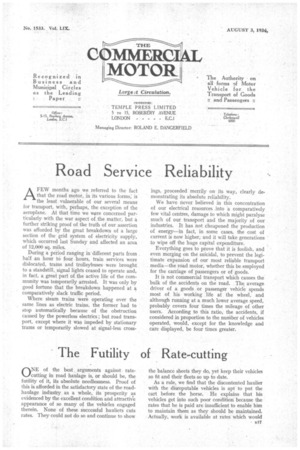Road Service Reliability
Page 29

If you've noticed an error in this article please click here to report it so we can fix it.
AFEW months ago we referred to the fact that the road motor, in its various forms; is the least vulnerable of our several means for transport, with, perhaps, the exception of the aeroplane. At that time we were concerned particularly with the war aspect of the matter, but a further striking proof of the truth of our assertion was afforded by the great breakdown of a large section of the grid system of electricity supply, which occurred last Sunday and affected an area of 12,000 sq. miles.
During a period ranging in different parts from half an hour to four hours, train services were dislocated, trams and trolleybuses were brought to a standstill, signal lights ceased to operate and, in fact, a great part of the active life of the community was temporarily arrested. It was only by good fortune that the breakdown happened at a comparatively slack traffic period.
Where steam trains were operating over the same lines as electric trains, the former had to stop automatically because of the obstruction caused by the powerless electrics ; but road transport, except where it was impeded by stationary trams or temporarily slowed at signal-less cross ings, proceeded merrily on its way, clearly demonstrating its absolute reliability.
We have never believed in this concentration of our electrical resources into 'a comparatively few vital centres, damage to which might paralyse much of our transport and the majority of our industries. It has not cheapened the production of energy—in fact, in some cases, the cost of current is now higher, and it will take generations to wipe off the huge capital expenditure.
Everything goes to prove that it is foolish, and even merging on the suicidal, to prevent the legitimate expansion of our most reliable transport media—the road motor, whether this be employed for the carriage of passengers or of goods.
It is not commercial transport which causes the bulk of the accidents on the road. The average driver of a goods or passenger vehicle spends most of his working life at the wheel, and although running at a much lower average speed, probably covers four times the mileage of other users. According to this ratio, the accidents, if considered in proportion to the nuniber of vehicles operated, would, except for the knowledge and care displayed, be four times greater.






















































































